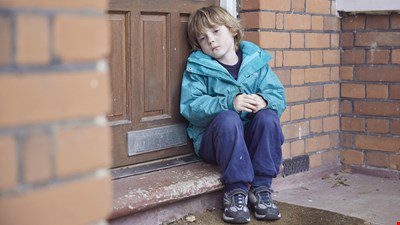· 800 referrals to police and social services in Wales in 2016/17
· 80% rise in referrals in Wales over five years
· Nearly 100 contacts to helpline for advice in Wales last year
The NSPCC refers an average of 16 reports of child neglect every week to Welsh police and social services, the charity’s latest figures reveal.
In 2016/17 the NSPCC Helpline dealt with 804 reports in this way following calls or emails from concerned adults – an 80% rise in the space of five years, up from 447 in 2011/12.
There were a further 91 contacts requesting advice about a child possibly facing neglect in Wales during 2016/17. UK-wide, the NSPCC made 16,882 referrals to children’s services or the police in 2016/17, equivalent to 46 a day.
Child neglect was mentioned in more than a quarter of all UK calls to the NSPCC Helpline in the last year. This rise shows that more people are willing to speak up about the issue. Neglect means that a child’s needs for safety, physical care and love are not being met to an extent that could cause them serious or lasting harm.
This can be due to a range of reasons, including parents not having the skills, support or funds to raise their children, with these causing adverse childhood experiences and leading to neglect.
A growing number of people contacting the NSPCC Helpline also described parents as having a problem with alcohol and drugs, with some of them regularly leaving their children unsupervised so they could go drinking with friends.
One neighbour told Helpline staff:
“The children are home alone again; I saw the mother leave the house earlier this morning and its past midnight now. I’ve seen the children peer through the curtains a few times as if they’re waiting for her. She does this every Friday night to go out drinking with her mates. I’m really confused about what to do as I don’t want to ruin the relationship with the mother as we are neighbours but at the same time I am really worried about the children. What should I do?”
A family member of a suspected neglected child said:
“I am concerned for the safety of a little boy; he does not seem to be getting adequate care at home. His mother doesn’t seem interested in looking after him and lets him stay up all night; she has alcohol and drug abuse problems. He is regularly being left unsupervised and I am worried that he could seriously hurt himself at home alone, because I know it has happened before.”
NSPCC Cymru is calling for neglectful parenting to be a key priority for safeguarding boards, public service boards and government, as well as a multi-agency co-ordinated approach to help professionals recognise all types of neglect and supports families struggling to meet their child’s needs particularly during the first 1,000 days of their lives.
Neglect can have serious and long-lasting effects both physically and mentally; with children suffering disabilities and malnutrition, as well as poor mental development and social skills.
Common signs and symptoms adults may notice in a child who is being neglected include:
· The child may be aggressive and hostile, prone to angry outbursts or lashing out towards others
· The child may be more impulsive than others with poor concentration
· Neglected children may be particularly quiet or withdrawn
· Poor appearance and hygiene, they may be smelly or have unwashed clothes
· Left alone for a long time
· Poor language, communication or social skills
· Seem hungry or turn up to school without having breakfast or any lunch money
Des Mannion, head of NSPCC Wales, said: “Neglect can have severe and long-lasting consequences for children, and can also be an indicator of other forms of abuse. This is why it is so important for anyone suspecting a child of being neglected to contact the NSPCC Helpline, so we can alert the authorities to quickly step in and help those in need.
“At the same time, it is vital we understand the true nature and scale of child neglect in the UK so we can collectively support struggling families. We must also be more aware of emotional neglect, when parents do not provide warm, sensitive, loving parenting that children need.”
The NSPCC supports parents who are on drug or alcohol treatment programmes through their Parents Under Pressure service, providing them with help to develop secure and healthy relationships with their children.
Adults can contact the NSPCC Helpline 24 hours a day, 365 days a year on 0808 800 5000, or help@nspcc.org.uk

| [donate]
| Help keep news FREE for our readersSupporting your local community newspaper/online news outlet is crucial now more than ever. If you believe in independent journalism,then consider making a valuable contribution by making a one-time or monthly donation. We operate in rural areas where providing unbiased news can be challenging. |



















